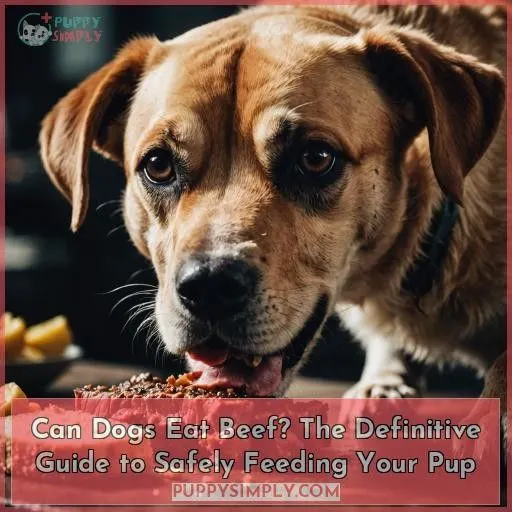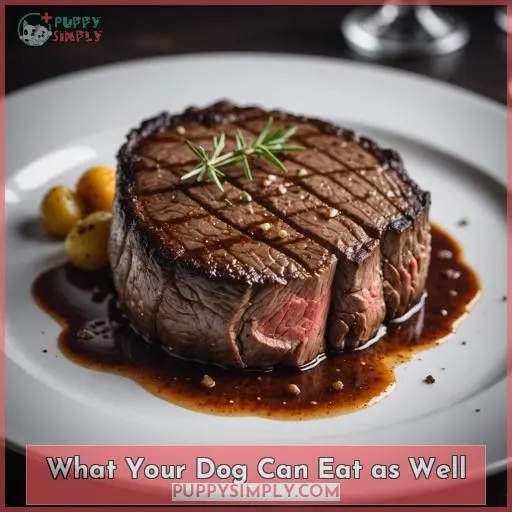This site is supported by our readers. We may earn a commission, at no cost to you, if you purchase through links.
 Yes, dogs can eat beef as a high-quality protein source.
Yes, dogs can eat beef as a high-quality protein source.
Lean, cooked beef muscle and organs like heart or liver offer excellent nutrition when served appropriately.
However, you’ll want to avoid fatty, fried, or seasoned beef, as well as bones, which can be dangerous.
It’s best to provide cooked beef in moderation as a supplement to your pup’s balanced diet, not as their sole food source.
Monitor for any allergic reactions.
To learn the ideal ways to safely incorporate beef into your dog’s meals, portion sizes to follow, and other healthy options to consider, read on.
Table Of Contents
Key Takeaways
- Lean, cooked beef muscle and organs like heart or liver offer excellent nutrition for dogs when served appropriately, but fatty, fried, or seasoned beef, as well as bones, should be avoided.
- Cooked lean beef muscle and beef organs such as the heart and liver are exceptional choices for dogs, providing a protein-rich and nutritious meal, while fried or fatty beef, preserved or seasoned beef, beef bones, and spoiled beef can be unsafe.
- Cooked beef can be a nutritious addition to a dog’s diet, but it should not replace a balanced commercial dog food, and portion sizes should be monitored.
- Along with cooked beef, dogs can safely enjoy a variety of healthy foods such as fruits, seafood, beans, vegetables, and some nuts in moderation.
Can Dogs Eat Beef?
Yes, dogs can eat beef!
As a high-quality protein source, beef provides essential amino acids for muscle development and overall health.
However, be mindful that some dogs may have beef allergies, causing itchy skin or digestive issues.
If your pup shows signs of sensitivity, consider hypoallergenic beef alternatives.
For digestibility, feed cooked lean beef muscle or organs like heart and liver.
Consult your veterinarian for appropriate portion sizes based on your dog’s age, activity level, and any medical conditions.
With proper preparation and moderation, beef can be a nutritious addition to your canine companion’s diet.
What Cooked Meat is Good for Dogs?
Concerning prepared meat, lean beef muscle and beef organs such as the heart and liver are exceptional choices for your canine companion. These protein-rich cuts not just deliver necessary nutrients but also present a delectable and fulfilling repast for your furry friend.
Lean Beef Muscle
Lean beef muscle is an excellent protein source for your pup. Boiled or steamed lean beef is a safe, nutritious option. Avoid fried or fatty beef, which can cause pancreatitis. Ground beef should be cooked to 160°F to kill any harmful bacteria. Beef meatloaf or beef stew can also be healthy treats for your dog.
Beef Organs (e.g. Heart, Liver)
Beef organs like liver and heart are excellent sources of nutrients for your dog. Liver is packed with vitamin A, iron, and copper, which support immune function and healthy skin. Heart is rich in protein, iron, and zinc to promote muscle growth and cardiovascular health. Incorporating these beef organ meats as supplements can provide a nutritional boost for your pup.
What Cooked Meat is Not Good for Dogs?
While lean beef muscle and beef organs can be beneficial for dogs, you’ll want to avoid feeding your pup fried or fatty beef, preserved or seasoned beef, beef bones like ribs, and spoiled beef. These types of beef can cause issues like pancreatitis, toxicity, dental damage, choking hazards, gut blockages, and food poisoning.
Fried or Fatty Beef
You’ll want to avoid giving your pup fried, fatty, or greasy beef as it can lead to:
- Weight gain
- Pancreatitis (inflammation of the pancreas)
- Gastrointestinal issues
- Increased risk of heart disease
- Difficulty digesting the high fat content
Stick to lean, boiled, or steamed beef for a healthy protein source. Processed, spoiled, or preserved beef isn’t safe either.
Preserved or Seasoned Beef
Preserved or seasoned beef can also be unsafe for your dog. The high salt and spice content can cause stomach upset and even toxicity. Beef jerky made for humans often contains ingredients that are harmful to dogs. Instead, opt for plain, unseasoned beef or beef broth to avoid any potential issues.
Beef Bones (e.g. Ribs)
Beef bones, including ribs, can pose serious dangers for dogs. The bones can splinter and cause choking, puncture the digestive tract, or lead to dental damage and gut blockages. Steak bones are especially risky, as they’re dense and prone to splintering. It’s best to avoid feeding any type of beef bones to your dog.
Spoiled Beef
Spoiled beef can pose serious health risks for your dog.
Consuming spoiled meat can lead to food poisoning, bacterial growth, and severe digestive upset.
Always discard any ground beef, corned beef, or other beef products that have passed their expiration date or show signs of spoilage.
Stick to fresh, properly stored cooked beef as a safe everyday treat for your pup.
Can I Feed My Dog Cooked Beef Every Day?
While cooked beef can be a nutritious addition to your pup’s diet, it shouldn’t be the sole source of their meals. Beef is an excellent protein source, but it lacks the complete nutrition dogs need. Feeding cooked beef daily as a meal topper or treat is generally safe, but it shouldn’t replace a balanced commercial dog food.
Be mindful of portion sizes and stick to leaner cuts like chuck or round steak. Avoid fatty, fried, or seasoned beef, as these can cause digestive issues. If your dog has a beef allergy, consult your vet about safe alternatives. And always introduce new foods slowly to monitor for any reactions. With the right approach, cooked beef can be a delicious and healthy part of your dog’s diet.
What Your Dog Can Eat as Well
Along with cooked beef, you can introduce a variety of healthy foods into your dog’s diet.
These include fruits like blueberries and bananas.
Lean seafood like salmon and tuna.
Beans.
Vegetables like sweet potatoes and green beans.
Nuts in moderation.
Remember to gradually introduce new foods.
Monitor for any adverse reactions.
Consult your veterinarian for specific dietary recommendations customized to your dog’s needs.
Fruits
Your pup can safely enjoy a variety of fruits like carrots, blueberries, pineapple, and blackberries.
However, be cautious with green tomatoes, which contain a toxin called tomatine.
Stick to fresh or frozen green peas, and avoid canned corn due to choking hazards.
Nuts like cashews and almonds should also be limited.
Overall, fruits, vegetables, and seafood can make great additions to your dog’s diet.
Seafood
Seafood like salmon is an excellent source of protein, omega-3 fatty acids, and other essential nutrients for your pup.
Blueberries and blackberries are packed with antioxidants.
Pineapple contains bromelain, an enzyme that can aid digestion.
However, be cautious of corn, as it’s a common allergen for some dogs.
Moderation is key when feeding your canine companion seafood and other human foods.
Beans
Beans can be a healthy addition to your dog’s diet. Safe options include cooked green beans, lima beans, and kidney beans. Beans provide fiber, protein, and essential vitamins and minerals. Just be sure to introduce them slowly and in moderation, as too many beans can cause digestive upset. Consult your vet before adding any new foods to your pup’s meals.
Vegetables
Vegetables are a great addition to your dog’s diet! Offer fresh or frozen green peas, which are safe and nutritious. Avoid raw yeast dough, as it can be toxic. As for treats, opt for dog-safe jerky over human snacks. With a little care, you can keep your pup happy and healthy with tasty veggies.
Nuts
Regarding nuts, it’s crucial to be wary of which ones you offer your canine buddy. Cashews and almonds are generally safe in moderation, while cottage cheese is a superior alternative. Steer clear of macadamia nuts, as they can be detrimental to dogs. Always consult your veterinarian before introducing novel foods to your pup’s diet.
| Nut | Safe for Dogs? | Serving Size |
|---|---|---|
| Cashews | Yes, in moderation | 1-2 per day |
| Almonds | Yes, in moderation | 1-2 per day |
| Macadamia Nuts | No | None |
| Peanuts | Yes, in moderation | 1-2 per day |
| Walnuts | No | None |
Frequently Asked Questions (FAQs)
Can dogs eat raw beef?
Nope, you shouldn’t feed Fido raw beef. While it’s protein-packed, raw meat carries risks like bacterial contamination and potential parasites. Play it safe—cook that beef thoroughly before sharing with your furry friend.
Is beef liver safe for dogs?
Yes, beef liver is safe and nutritious for dogs in moderation. It’s packed with protein, vitamins A and B12, iron, and copper. However, liver is high in vitamin A, so don’t overfeed it.
How much beef can I feed my dog?
Like a carefully trimmed steak, moderation is key when feeding beef – a few ounces per 20 lbs of dog weight, 1-2 times weekly, cooked plainly, pairs perfectly with a balanced diet.
Can dogs eat beef bones?
No, you shouldn’t feed your dog beef bones. They pose serious health risks like dental damage, choking hazards, punctures, and intestinal blockages. Stick to lean beef muscle or organ meats cooked safely for a nutritious protein source.
What are the benefits of feeding beef to dogs?
Beef provides an excellent protein source and valuable nutrients like vitamin B12, zinc, and iron for your dog’s overall health and well-being. Its lean cuts make safe, nutritious meal toppers or treats.
Conclusion
Feeding your pup cooked beef is akin to offering them a delectable, protein-packed treat.
With moderation and proper preparation, this tasty addition can allow dogs to eat beef safely and provide essential nutrients.
Complement their balanced diet judiciously, monitor reactions closely, and you’ll have a content, healthy canine companion.










